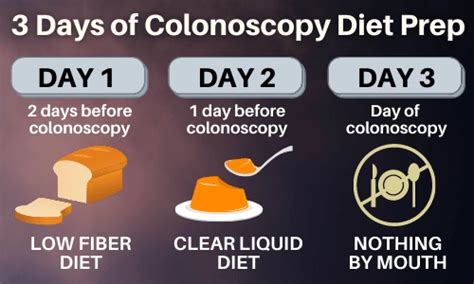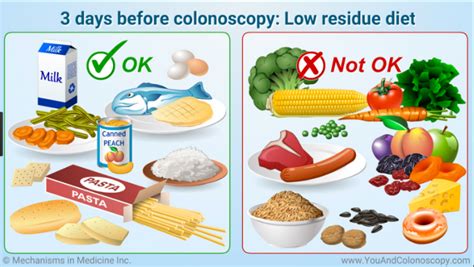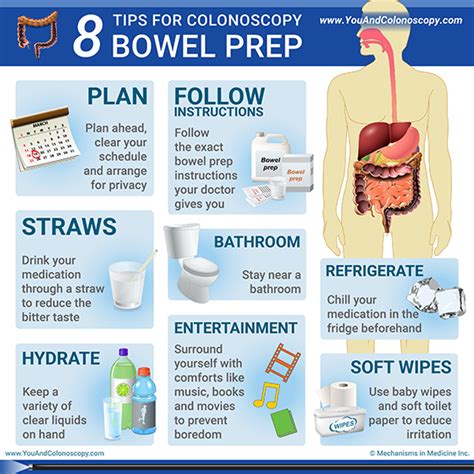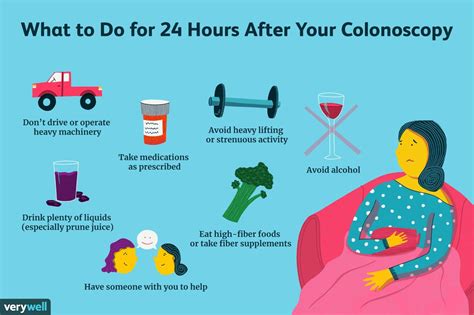Intro
Prepare for a colonoscopy with a specialized diet. Learn 7 tips for a successful colonoscopy prep, including low-fiber foods, bowel prep, and colon cleanse methods for a clean colon.
Preparing for a colonoscopy can be a daunting task, especially when it comes to the dietary restrictions that come with it. A colonoscopy is a medical procedure that allows doctors to visually examine the inside of the colon and rectum for any signs of cancer, polyps, or other abnormalities. To ensure a successful procedure, patients are typically required to follow a special diet in the days leading up to the colonoscopy. This diet is designed to help cleanse the bowel and reduce the risk of complications during the procedure.
The importance of following a colonoscopy diet cannot be overstated. Failing to do so can lead to inaccurate test results, increased risk of complications, and even the need for repeat procedures. Furthermore, a well-planned diet can help minimize discomfort and reduce the risk of adverse reactions to the procedure. In this article, we will explore the ins and outs of the colonoscopy diet, including 7 tips to help you prepare for a successful procedure.
A colonoscopy diet typically involves a gradual transition to a clear liquid diet in the days leading up to the procedure. This diet is designed to give the bowel a chance to rest and reduce the amount of stool in the colon. By following a clear liquid diet, patients can help ensure that their colon is as clean as possible, which can improve the accuracy of the test results. In addition to the clear liquid diet, there are several other tips that patients can follow to help prepare for a colonoscopy.
Understanding the Colonoscopy Diet

Benefits of the Colonoscopy Diet
The benefits of the colonoscopy diet are numerous. By following this diet, patients can help reduce the risk of complications during the procedure, improve the accuracy of the test results, and minimize discomfort. Additionally, the colonoscopy diet can help reduce the risk of adverse reactions to the procedure, such as nausea and vomiting. By following the colonoscopy diet, patients can help ensure that their procedure is as safe and successful as possible.7 Tips for a Successful Colonoscopy Diet

Common Mistakes to Avoid
There are several common mistakes that patients make when it comes to the colonoscopy diet. These mistakes can include: * Not starting to prepare early enough * Not following a clear liquid diet * Eating solid foods or high-fiber foods too close to the procedure * Not staying hydrated * Consuming caffeine or alcohol too close to the procedure * Not following your doctor's instructions carefullyPre-Procedure Preparation

What to Expect During the Procedure
During the colonoscopy procedure, patients can expect to be given a sedative to help them relax and reduce any discomfort. The doctor will then insert a flexible tube with a camera and light on the end into the rectum and colon. The camera will transmit images of the inside of the colon to a monitor, allowing the doctor to visually examine the colon and rectum for any signs of cancer, polyps, or other abnormalities. The procedure typically takes about 30-60 minutes to complete, and patients can expect to feel some discomfort or cramping during the procedure.Post-Procedure Care

Conclusion and Next Steps
In conclusion, a colonoscopy is a medical procedure that allows doctors to visually examine the inside of the colon and rectum for any signs of cancer, polyps, or other abnormalities. By following a colonoscopy diet and taking the necessary steps to prepare for the procedure, patients can help ensure that their procedure is as safe and successful as possible. If you have any questions or concerns about the colonoscopy diet or the procedure itself, be sure to speak with your doctor. They can provide you with personalized guidance and support to help you prepare for a successful procedure.What is a colonoscopy diet?
+A colonoscopy diet is a specialized diet that is designed to help prepare the bowel for a colonoscopy procedure. The diet typically involves a gradual transition to a clear liquid diet in the days leading up to the procedure.
Why is it important to follow a colonoscopy diet?
+Following a colonoscopy diet is essential for a successful procedure. The diet helps to cleanse the bowel and reduce the risk of complications during the procedure. By following the diet, patients can help ensure that their colon is as clean as possible, which can improve the accuracy of the test results.
What are some common mistakes to avoid when following a colonoscopy diet?
+Some common mistakes to avoid when following a colonoscopy diet include not starting to prepare early enough, not following a clear liquid diet, eating solid foods or high-fiber foods too close to the procedure, not staying hydrated, consuming caffeine or alcohol too close to the procedure, and not following your doctor's instructions carefully.
We hope this article has provided you with the information you need to prepare for a successful colonoscopy diet. Remember to follow your doctor's instructions carefully and take the necessary steps to prepare for the procedure. If you have any questions or concerns, be sure to speak with your doctor. They can provide you with personalized guidance and support to help you prepare for a successful procedure. Don't forget to share this article with your friends and family, and leave a comment below if you have any questions or concerns.
